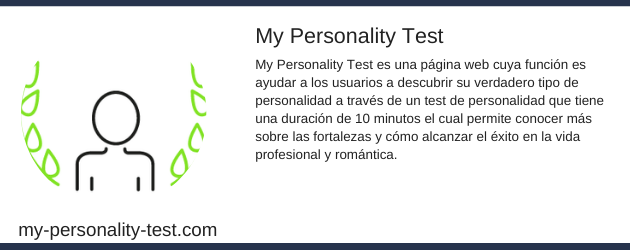
You may have heard of personality-based marketing. Nowadays, these two terms go hand in hand in creating a segmentation strategy for any brand. Therefore, this time we will explain why and how this concept works. So read on.
If you work in marketing and want to assign an identity to each brand, it is essential to take into account the personality types of each consumer since personality determines their behavior when they are ready to purchase a product or pay for a service.
That means that the personality traits of each person specifically influence the motivation to buy, whether it is a product or service. Also when choosing one brand over another.
At this point, we can say that personality-based marketing or also known as psychometrics applied to marketing, is simply a segmentation strategy in which it is necessary to collect people’s personality traits to create a profile of a target audience and thus connect effectively with them.
In this way, attractive messages or offers can be prepared for a specific target audience.
Unlike other marketing strategies, which use interests and other aspects to profile consumers, this one focuses on psychological traits. To obtain and measure this data, we can use different psychometric models. One of them is called OCEAN for its acronyms: Broadness of vision (openness), Meticulousness (Conscientiousness), Extroversion, Affability, and Neuroticism.
How effective is personality-based marketing?
With the emergence of digital marketing and neuromarketing, the options for determining the buyer persona of any brand or service have been expanded. This has resulted in personality-based marketing, which has proven to be highly effective in spreading advertising messages to a specific audience.
This strategy is so effective that many experts recommend it to brands of all sizes.
How to plan a personality-based marketing strategy?
To create a personality-based marketing strategy, it is essential to obtain data and metrics on personality traits. Determine how our target audience behaves, their needs, interests, and pain points, among other factors.
A few years ago, it was much more difficult to obtain this data since not all the tools we can find on the Internet exist today. To collect this information, marketers had to create questionnaires directed at potential targets. But now, it has become much easier to use the consumer information that can be found on social media and also, as we have already mentioned, with targeting tools.
Michal Kosinski was the first to study this strategy when he decided to collect data through Facebook. This is how he realized that it worked (still not perfectly). As a result, this strategy began to be used by other marketers who started to analyze user behavior on social media and other channels.
After compiling this data, we can create personalized messages that will be directed to our target audience segmented based on personality. These campaigns are then published on the appropriate media (such as Instagram, Facebook, and email, among others) to build loyalty.
Without a doubt, this new marketing strategy shows us that there is still a lot to learn about consumers. And thanks to advances in technology, we can implement this powerful segmentation strategy, that will have an exponential impact on our marketing campaigns.
Types of personality profiles
Experts highlight four types of personalities in marketing, according to how people consume products or services. So companies must create a plan that is effective for each specific personality type. Let’s take a look at each of them:
· An assertive
People with an assertive personality usually set goals and like to compete. They love to get results quickly; it is one of their priorities. They like to get information as fast as possible, without wasting time.
How should you create your campaign for this type of user? In this sense, specialists indicate that it is necessary to transmit professionalism, speed, and solve problems and doubts above all. It would be best if you offered solutions without making vague promises about the product. They don’t like to receive repeated messages, preferring direct, relevant, and precise information. Instead, companies should design social media campaigns and business text messaging for customers in a way that considers their pain points and offer real solutions.
· Friendly
They love to participate in many activities on a daily basis; they are quite creative and, therefore, like new things. When it comes to business or partnership with a company or entity, they want to convey confidence. When it comes to buying, they seek other people’s opinions because they love to interact.
In this case, companies should base their campaign on creating a relationship of trust and not rush to make the sale. For example, you should advise, show the advantages of your product, guide on how to obtain the product, and make them feel comfortable with your company.
· Expressive
These users love to talk about their experiences and are very expressive. Every time they talk about a product, they narrate personal experiences and love to see others happy and connect with others. They base their buying decision purely on intuition.
This is one of the most complex consumer types, as data or statistics are ineffective. Instead, as a brand, you must establish a humanization campaign that generates a more intimate relationship with these customers. It is very important to demonstrate the effectiveness of your product through testimonials since users with an expressive profile will make their buying decision taking this aspect into consideration.
· Analytical
As the name implies, an analytical person takes data, analyzes it, and also seeks all kinds of information related to the product. They are not easy to convince because their purchase is based purely on logic and not on experiences, testimonials, or trust, as happens in other cases. They value to the maximum every detail about products or services.
When a company wants to reach this kind of public, it must be transparent about the data and information it offers. For example, if you want to promote a smartphone, each and every technical specification must be shown without leaving any gaps or making promises that can’t be proven. Only then will it be possible to convince these users to buy!
And now that we have finished looking at some general categories, you already know the personality type of the buyer persona that you want to target. Have you implemented the right strategies for your specific case? When in doubt, it is best to re-analyze the characteristics of users potentially interested in your brand. Only then you will get good results from your personality-based marketing campaign. Don’t stop trying! It’s worth it because it will make a difference.
